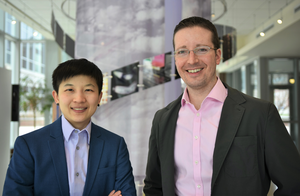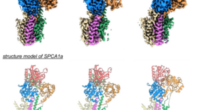Researchers from the Department of Energy’s Center for Advanced Bioenergy and Bioproducts Innovation (CABBI) at the University of Illinois Urbana-Champaign have developed a new wastewater treatment process that could substantially improve the financial viability of biorefineries. The new process, which can efficiently convert organic contaminants in biorefinery wastewater to biogas, can achieve simultaneous energy recovery and wastewater treatment, reducing energy consumption, operating costs, and greenhouse gas emissions compared to conventional treatment systems. Using their open-source software BioSTEAM, the researchers simulated the integration of the new wastewater treatment process into seven biorefinery designs, finding that it could improve their financial viability and reduce their environmental impact. This new approach could contribute to the industry’s sustainable future by reducing costs and improving environmental sustainability, supporting a viable, sustainable domestic biofuels and bioproducts industry using plant biomass.
Wastewater as a Source of Energy: Improving Biorefinery Sustainability
Researchers at the Department of Energy’s Center for Advanced Bioenergy and Bioproducts Innovation (CABBI) have found a way to recover valuable resources from wastewater to improve the economic and environmental sustainability of second-generation biorefineries. Biorefineries convert plants into fuels, but the organic materials found in the wastewater from this process cannot be efficiently treated with conventional systems. However, these materials can be recovered as valuable products, such as biogas, a clean-burning renewable fuel.
The CABBI team has designed a process that simultaneously treats wastewater and recovers biogas energy, which could generate revenue for biorefineries. This approach reduces costs and greenhouse gas emissions compared to conventional treatment systems, making it more sustainable. By recovering resources from wastewater, the economic and environmental sustainability of the plant-based biofuels and bioproducts industry is supported, furthering the transition to a more sustainable future.
The study, which was published in ACS Sustainable Chemistry & Engineering, united researchers from all three CABBI themes: Feedstock Production, Conversion, and Sustainability. They aim to develop plant-based alternatives to petroleum for fuels and chemical products by producing biofuels, biochemicals, and foundation molecules directly in plant leaves and stems. They also use unique tools, yeasts, and processing methods to convert them into high-value bioproducts, such as biodiesel, organic acids, lubricants, and alcohols. Finally, they assess the economic and ecological sustainability of CABBI feedstocks, biofuels, and bioproducts, from the field to the biorefinery to the bioeconomy.
This approach could substantially improve the sustainability of biorefineries, making them more economically and environmentally viable. It provides a new way to recover valuable resources from wastewater and reduce costs, supporting the transition to a more sustainable future.
High-Rate Anaerobic-Dominant Wastewater Process for Improved Biorefinery Sustainability
Researchers at the University of Illinois Urbana-Champaign have developed a new wastewater treatment process that could improve the economic and environmental sustainability of second-generation biorefineries. Second-generation biorefineries process non-food feedstocks like miscanthus and corn stover, producing biofuels and bioproducts with lower environmental impact than fossil fuels or first-generation biorefineries, which use corn and other edible crops. However, these biorefineries face financial hurdles that prevent their successful deployment in the real world.
To produce fuel and valuable biochemicals from plant biomass, biorefineries can use up to 10 liters of water per liter of biofuel produced, based on a previous CABBI study. The resulting wastewater has high concentrations of organic material, making it difficult to reuse. Conventional, low-rate wastewater treatment technologies are expensive, energy-intensive, and require a huge physical footprint. They use large aerobic reactors, which consume large amounts of electricity for aeration, and convert the organic materials from the wastewater to carbon dioxide without creating valuable products.
The CABBI team designed a high-rate anaerobic-dominant wastewater process that largely eliminated aeration, saving electricity, and instead incorporated emerging technologies, including internal circulation and anaerobic membrane bioreactors to recover the embedded energy in the organic materials as biogas. For their design, they used experimental data from wastewater generated by the processing of sugarcane and oilcane cultivated by the Altpeter group for CABBI’s Feedstocks to Fuels project. The process extracts the plant’s oils and then generates ethanol from plant sugars through fermentation by yeasts. The Singh group provided spent fermentation broth, after the ethanol was extracted, and collaborators from the Pontificia Universidad Católica de Chile determined how much methane could be produced from the real samples.
The new wastewater treatment process is more sustainable and can substantially improve the economic and environmental sustainability of second-generation biorefineries. By recovering resources from wastewater, the process reduces costs and greenhouse gas emissions compared to conventional treatment systems, making it more viable. It provides a new way to recover valuable resources from wastewater and support the transition to a more sustainable future.
The study was led by two CABBI Sustainability researchers at the University of Illinois Urbana-Champaign: Jeremy Guest, Associate Professor of Civil and Environmental Engineering (CEE); and Research Scientist Yalin Li of the Institute for Sustainability, Energy, and Environment (iSEE). CABBI co-authors included Vijay Singh, Conversion researcher, Deputy Director for Science & Technology, and Professor of Agricultural and Biological Engineering (ABE) at Illinois; and Feedstock Production researcher Fredy Altpeter, Professor of Agronomy at the Institute of Food and Agricultural Sciences at the University of Florida.
This approach is critical in making biorefineries more sustainable and could pave the way for future advancements in the field. The CABBI team’s new wastewater treatment process could potentially improve the economic and environmental sustainability of second-generation biorefineries, furthering the transition to a more sustainable future.
New Wastewater Treatment Process to Improve Biorefinery Viability
Researchers have developed a new wastewater treatment process that could substantially reduce the capital cost and energy usage of biorefineries, thus improving their financial viability and reducing their environmental impact. Using their open-source software BioSTEAM, the researchers simulated the integration of the new wastewater treatment process into seven biorefinery designs, covering a wide range of feedstocks and biofuels/bioproducts. They found that the new process could efficiently convert organic contaminants in biorefinery wastewater to biogas, achieving simultaneous energy recovery and wastewater treatment. This approach would reduce energy consumption, operating costs, and greenhouse gas emissions compared to conventional treatment systems.
Proper management of wastewater can be a potential source of revenue for biorefineries while improving the environmental sustainability of biofuels and bioproducts. The wastewater treatment process designed in this study can substantially improve the financial viability of second-generation biorefineries while reducing their environmental impacts, contributing to society’s transition to a circular bioeconomy and CABBI’s mission to support a viable, sustainable domestic biofuels and bioproducts industry using plant biomass.
The researchers behind the study came from the Department of Energy’s Center for Advanced Bioenergy and Bioproducts Innovation (CABBI) at the University of Illinois Urbana-Champaign. The team used a techno-economic analysis and life cycle assessment enabled by BioSTEAM to evaluate the effectiveness of the new process in seven biorefinery designs. The study’s co-authors include George Kontos and Thomas Parkinson from CEE at Illinois, Mothi Viswanathan from ABE at Illinois, Daniela Cabrera and Rodrigo Labutut from the Pontificia Universidad Católica de Chile, and Nickolas Avila from CEE at Illinois.
The study’s findings highlight the importance of innovative wastewater management in the biorefinery industry. The new wastewater treatment process could contribute to the industry’s sustainable future, reducing costs, and improving environmental sustainability.
Don’t miss interesting posts on Famousbio









